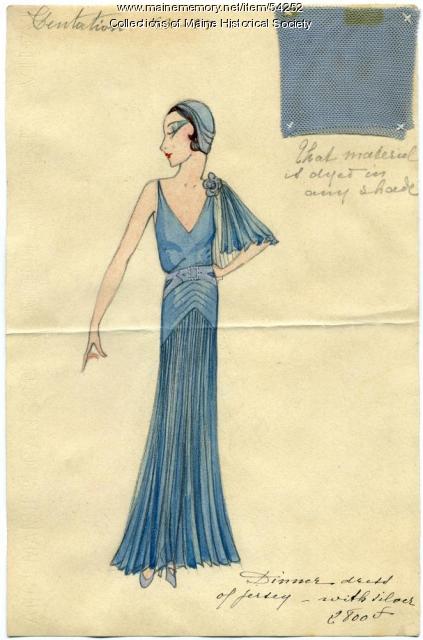Keywords: Mexico
- Historical Items (105)
- Tax Records (0)
- Architecture & Landscape (0)
- Online Exhibits (12)
- Site Pages (21)
- My Maine Stories (5)
- Lesson Plans (0)
Online Exhibits
Your results include these online exhibits. You also can view all of the site's exhibits, view a timeline of selected events in Maine History, and learn how to create your own exhibit. See featured exhibits or create your own exhibit
Exhibit
Cosmopolitan stylings of Mildred and Madeleine Burrage
Born in Portland, sisters Mildred Giddings Burrage (1890-1983) and Madeleine Burrage (1891-1976) were renowned artists and world travelers. Mildred's experiences studying painting in Paris and Italy, and the sisters' trips to Mexico and Guatemala inspired their artwork and shared passions for cosmopolitan and stylish attire. Housed at Maine Historical Society, The Burrage Papers include selections of original advertising drawings called "line sheets" from Parisian fashion houses dating from 1928 to 1936. Images of Madeleine's gemstone jewelry and Mildred's artwork accompany intimate family photographs of the sisters.
Exhibit
Doing Good: Medical Stories of Maine
Throughout Maine’s history, individuals have worked to improve and expand medical care, not only for the health of those living in Maine, but for many around the world who need care and help.
Exhibit
Post office clerks began collecting strong red, white, and blue string, rolling it onto a ball and passing it on to the next post office to express their support for the Union effort in the Civil War. Accompanying the ball was this paper scroll on which the clerks wrote messages and sometimes drew images.
Exhibit
George Henry Preble of Portland, nephew of Edward Preble who was known as the father of the U.S. Navy, temporarily lost his command during the Civil War when he was charged with failing to stop a Confederate ship from getting through the Union blockade at Mobile.
Exhibit
Maine Sweets: Confections and Confectioners
From chocolate to taffy, Mainers are inventive with our sweet treats. In addition to feeding our sweet tooth, it's also an economic driver for the state.
Exhibit
Yarmouth's "Third Falls" provided the perfect location for papermaking -- and, soon, for producing soda pulp for making paper. At the end of the 19th century and beginning of the 20th, Yarmouth was an international leader in soda pulp production.
Exhibit
Maine Streets: The Postcard View
Photographers from the Eastern Illustrating and Publishing Co. of Belfast traveled throughout the state, especially in small communities, taking images for postcards. Many of these images, taken in the first three decades of the twentieth century, capture Main Streets on the brink of modernity.
Exhibit
Bookplates Honor Annie Louise Cary
A summer resident of Wayne collected more than 3,000 bookplates to honor Maine native and noted opera singer Annie Louise Cary and to support the Cary Memorial Library.
Exhibit
Immigration is one of the most debated topics in Maine. Controversy aside, immigration is also America's oldest tradition, and along with religious tolerance, what our nation was built upon. Since the first people--the Wabanaki--permitted Europeans to settle in the land now known as Maine, we have been a state of immigrants.
Exhibit
Dressing Up, Standing Out, Fitting In
Adorning oneself to look one's "best" has varied over time, gender, economic class, and by event. Adornments suggest one's sense of identity and one's intent to stand out or fit in.
Exhibit
CODE RED: Climate, Justice & Natural History Collections
Explore topics around climate change by reuniting collections from one of the nation's earliest natural history museums, the Portland Society of Natural History. The exhibition focuses on how museums collect, and the role of humans in creating changes in society, climate, and biodiversity.
Exhibit
The history of the region now known as Maine did not begin at statehood in 1820. What was Maine before it was a state? How did Maine separate from Massachusetts? How has the Maine we experience today been shaped by thousands of years of history?












